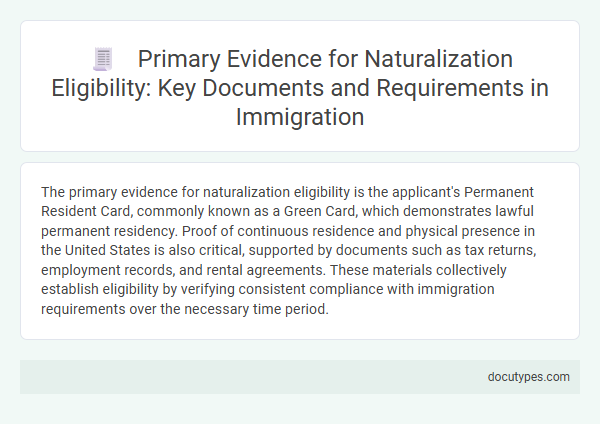The primary evidence for naturalization eligibility is the applicant's Permanent Resident Card, commonly known as a Green Card, which demonstrates lawful permanent residency. Proof of continuous residence and physical presence in the United States is also critical, supported by documents such as tax returns, employment records, and rental agreements. These materials collectively establish eligibility by verifying consistent compliance with immigration requirements over the necessary time period.
Introduction to Naturalization Primary Evidence
What is the primary evidence required for naturalization eligibility? The main document used to prove eligibility for U.S. naturalization is the Permanent Resident Card, commonly known as the Green Card. This card serves as official proof of your lawful permanent resident status, which is essential for the naturalization process.
Essential Documents for Naturalization Eligibility
Primary evidence for naturalization eligibility includes essential documents such as your Permanent Resident Card (Green Card) and proof of continuous residence in the United States. These documents verify your lawful permanent resident status and demonstrate meeting residency requirements.
Additional critical evidence includes Form N-400, Application for Naturalization, and supporting documents like tax returns, employment records, and proof of physical presence. Providing accurate and complete documentation ensures the naturalization process proceeds smoothly and efficiently.
Proof of Lawful Permanent Residency (Green Card)
The primary evidence for naturalization eligibility is proof of lawful permanent residency, commonly documented by a Green Card. This evidence confirms your legal right to reside permanently in the United States, which is essential for applying for citizenship.
- Green Card - The official document issued by the U.S. Citizenship and Immigration Services (USCIS) as proof of lawful permanent resident status.
- Permanent Resident Status - Establishes that you have been legally authorized to live and work in the U.S. indefinitely.
- Eligibility Verification - Validates your residency duration, which is a critical requirement for naturalization eligibility.
Evidence of Continuous Residence and Physical Presence
The primary evidence for naturalization eligibility centers on proof of continuous residence and physical presence in the United States. These criteria demonstrate your commitment to maintaining a permanent home and abiding by legal requirements.
- Continuous Residence - Documentation such as rental agreements, tax returns, or employment records showing uninterrupted living in the U.S. over the required period.
- Physical Presence - Evidence including travel records, passport stamps, or affidavits confirming actual time spent physically within the country.
- Absence Limits - Proof that absences from the U.S. did not exceed the maximum days allowed, ensuring residency is not considered abandoned.
Providing solid evidence of continuous residence and physical presence is essential to support your naturalization application successfully.
Documentation of Good Moral Character
Primary evidence for naturalization eligibility includes documentation proving good moral character. This documentation is essential to demonstrate that you meet the legal standards required by immigration authorities.
Common documents include court records, tax returns, and letters of recommendation. These help establish a consistent history of lawful and ethical behavior over the required statutory period.
Proof of English Language Proficiency
Proof of English language proficiency is a crucial component of the primary evidence for naturalization eligibility. Applicants typically demonstrate this through passing an English test or providing valid exemptions based on age and disability. Your ability to read, write, and speak English is assessed to ensure compliance with U.S. Citizenship and Immigration Services (USCIS) requirements.
Required Civics Knowledge Documentation
Proof of civics knowledge is a crucial component in establishing eligibility for naturalization. Applicants must demonstrate an understanding of U.S. history and government through official documentation.
- Naturalization Test Results - Applicants must submit evidence of passing the civics portion of the naturalization test administered by U.S. Citizenship and Immigration Services (USCIS).
- Study Materials Completion - Documentation showing completion of USCIS-provided study materials supports preparedness for the required civics knowledge assessment.
- Interview Records - USCIS interview notes serve as official proof that naturalization candidates demonstrated requisite civics knowledge during the eligibility review.
Birth and Identity Documents for Naturalization
Primary evidence for naturalization eligibility centers on birth and identity documents that prove an applicant's eligibility status. These documents confirm the individual's age, identity, and lawful presence necessary for U.S. citizenship.
Eligible birth certificates must be official and include the applicant's full name, date of birth, and place of birth. Other acceptable identity documents include valid passports, state-issued identification cards, and permanent resident cards. These documents verify identity and support the naturalization application by substantiating lawful residency and age requirements.
Supporting Evidence for Marital Status (Spousal Cases)
| Primary Evidence for Naturalization Eligibility | Your primary evidence includes proof of continuous residence, good moral character, and lawful permanent resident status. Documentation such as a Permanent Resident Card (Green Card) is essential. |
|---|---|
| Supporting Evidence for Marital Status (Spousal Cases) |
|
What Is the Primary Evidence for Naturalization Eligibility? Infographic

